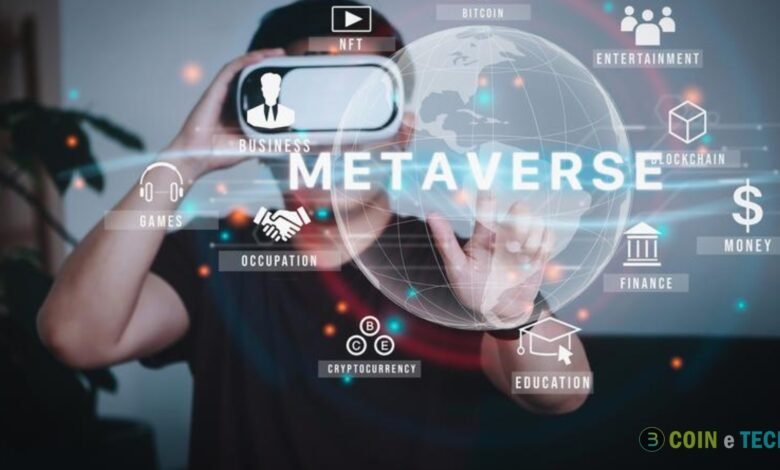Metaverse Marketing: An In-depth Explanation

Metaverse Marketing. Thanks to advancements in metaverse technology, the chance to create a future market is getting closer. Metaverse shows the concept of developing internet-connected, three-dimensional virtual worlds that give immersive experiences. The most prominent application of a metaverse that has attracted interest from businesses looking to implement it is in marketing. Metaverse marketing has helped popular brands reach a wider audience online. The marketing department is among the most critical areas of a company that has been making significant innovations recently. Use cases for a metaverse that personalizes marketing to target audiences show the marketing potential of the technology.
Coke and Nike are just two significant businesses that have taken notice of the steady progress in Metaverse’s potential to revolutionize digital user experiences, and celebrities are leading the way. This piece will give you the rundown if you want to know how to get a marketing leg up in the metaverse.
Why Should Brands Use Metaverse for Marketing?
As an illustration of the far-reaching effects of the digital revolution, the Metaverse is out. The usefulness of metaverse advertising in redefining virtual experiences indicates its appeal. Brands like Nike, Apple, Coca-Cola, Microsoft, and Facebook have made metaverse technology a critical strategic priority. Metaverse technology is gaining traction quickly, and studies predict that by 2024, the business will be worth about $800 billion.
The metaverse is used to build interactive digital worlds where users may move around and interact with one another in three dimensions. It would be best to let people know how vital virtual and augmented reality are for creating immersive experiences. The similarities between the metaverse and the actual world have provided a foundation for marketing use cases in which the metaverse can buy and sell virtual products using digital avatars. Brands could thus discover an alternate medium to communicate with their intended consumers. For instance, a billboard on a virtual property in the metaverse can provide fruitful advertising results.
Pillars of the Metaverse for Marketing
When it comes to advertising, what sets metaverse technology apart? Understanding the metaverse’s principles before delving into the best practices for developing a marketing plan. Understanding the metaverse’s mechanisms will shed light on its potential commercial benefits.
User-Generated Content
Content created and shared by users is the foundation of the metaverse, which is a world of possibilities beyond the traditional media of video, text, and images. The marketing examples of the metaverse, on the other hand, would demonstrate how users can build virtual assets and novel experiences within the metaverse, which is a critical component of user-generated content’s advantages in the metaverse and would alleviate brands’ concerns around copyrights in advertising content and marketing techniques.
Blockchain Technology
Blockchain is one of the leading forces driving the marketing usage of metaverse technology. Utilizing decentralization features can make accessing a shared and open world easier. To address the question “What is metaverse in marketing?” any reasonable response would inevitably touch on the blockchain. Indeed, blockchain guarantees that the metaverse is available to all users independently of any governing body. For this reason, the metaverse has the potential to level the playing field in online advertising.
Human-centric User Interfaces
User interfaces designed with humans in mind are another cornerstone of marketing-enabling metaverse technology. Better adoption rates for metaverse platforms could be achieved using human-centric technology. Metaverse Users can be piqued in several ways by implementing human-centric user interfaces. Brands stand to get a larger audience for their content advertisements if consumers easily navigate the Metaverse’s environments.
Creator Economy
Simply put, the creator economy is the backbone of the Metaverse. The metaverse, a virtual environment, would offer a fully autonomous economy built on NFTs and cryptocurrencies. Suppose you want to discover how metaverse is used in marketing. So, marketing in the metaverse has a double duty: increase brand awareness and pave the way for its growth. Brands create original content and experiences for the metaverse to reach their demographic and generate revenue.
Metaverse Marketing Different From Traditional Marketing?
A popular discussion area among those interested in metaverse technology has been its potential marketing uses. Metaverse is a new venue for consumers to buy things, and one of its possible applications is marketing. Brands may have new ways to promote their products in the new marketplace. As the internet has developed, so too has the concept of marketing.
During the first stage, known as Web 1.0, the main goal of marketing was to provide a website that displayed a company’s contact information. After that, web 2.0 expanded the possibilities for bringing people together and using their data to provide tailored services. Providing users with a fully immersive experience is the goal of the most recent version of the internet, web 3.0.
You may get the tools you need to build your virtual worlds that embody your brand in the metaverse. Creating a one-of-a-kind virtual experience amps up the benefits of immersive games. Brands can effectively showcase their products in the metaverse. Their digital avatars may virtually test clothing before buying it. One way the verse differs from more conventional forms of advertising is the almost limitless room for creativity it provides. In addition to sidestepping censorship issues, brands may build their virtual worlds and communities without depending on third-party platforms.
Examples of Metaverse Advertising
Referring to instances is the next crucial point to remember while trying to comprehend the effect of metaverse advertising. Integrating technologies like AI/ML, the Internet of Things (IoT), and new technological paradigms can be made possible via metaverse technology. Consequently, examples of metaverse marketing focus on how these technologies might be used effectively to meet marketing goals. Although several companies have made news about embracing the metaverse, few have metaverse works. The game industry was an early adopter of the metaverse and its promise. Companies across several sectors have taken various approaches to embracing the metaverse.
Gucci
A well-known brand that has successfully used metaverse advertising is Gucci. In 2021, with the assistance of Metaverse, the world-famous fashion house created a pair of digital sneakers called the Gucci Virtual 25. The Gucci Garden on Roblox is Gucci’s most recent foray into the virtual world. Gucci made the Roblox virtual world by drawing ideas from the Italian Gucci Garden Archetypes. On the site, individuals can interact virtually and purchase digital assets.
Microsoft Mesh
Microsoft Mesh stands out among the many ways businesses have utilized metaverse technology. Using cutting-edge mixed-reality apps, Mesh for Teams provides a novel platform for virtual meetings that can replicate the sensation of being physically there. With Microsoft Mesh, workers can collaborate in fully immersive 3D spaces that improve visualization and file sharing. With the increasing realism of virtual environments for collaboration and interaction, instances like these of metaverse use cases lay the groundwork for metaverse marketing.
Virtual Concerts and NFTs in Metaverse
Some of the more notable aspects of virtual concerts have also been included in the metaverse, where twelve million people tuned in to Travis Scott’s Fortnite virtual concert. With the launch of its own NFT line, Nike became yet another well-known brand that uses blockchain technology in its marketing campaigns.
Other Noticeable Examples of Metaverse Technology
For someone new to exploring the potential of metaverse sending and advertising, the initial focus is on grasping the basic principles of this virtual realm. Providing additional examples of brands investing in metaverse projects would give you a better understanding of the industry’s scope. As an illustration, Dimension Studio generated approximately $6.5 billion in revenue by exploring the metaverse of promoting fashion brands.
One interesting example that highlights the concept of metaverse marketing is Grand Theft Auto V. This game offers a vast open-world experience and boasts a large and diverse community of players from all over the globe. GTA V now offers clothing options that draw inspiration from the fashion choices of protestors in Hong Kong. It is interesting to observe how metaverse marketing can foster innovative avenues for users to share their perspectives.
One exciting example of a metaverse application in the marketing field is the home décor company Houzz. It has successfully leveraged the Metaverse, a digital photo collection of furniture and home décor items. Virtual concerts have showcased the prominence of metaverse advertising. Travis Scott hosted a virtual concert on Fortnite that attracted about 12 million people. Metaverse has also embraced blockchain technology to enhance its marketing efforts, as evidenced by the introduction of its own NFT collection.
How Can You Use Metaverse Marketing for Your Brand?
Metaverse focuses on creating a captivating customer experience that immerses them in unique and diverse virtual worlds powered by fresh and exciting content. Organizations are setting new objectives to enter the marketplace and ensure ongoing progress. The metaverse has numerous avenues for brands to create compelling marketing strategies that resonate with their customers. Here are some best practices for leveraging metaverse technology to enhance brand promotion.
Collectables Can Serve as a Selling Point
Utilizing collectibles has proven to be an extremely effective marketing strategy in the metaverse. It is a highly effective strategy for leveraging marketing in the metaverse. Non-fungible tokens demonstrate consumers’ affiliation with a particular brand and serve to engage users with the community.
Interactive Live Events
Utilizing the advantages of metaverse marketing has been gaining significant traction, and it is essential that your business leverage live events in the metaverse to give consumers a unique opportunity to engage with brands in a new way. For instance, a virtual launch on the Metaverse will provide you with a deeper understanding of the product than a physical launch event. Metaverse presents a valuable brand opportunity, enabling customers to experience and test their products and services.
Try New Experiments
One key recommendation for maximizing the benefits of metaverse advertising is to embrace a spirit of experimentation. Adopting innovative principles when developing metaverse technology marketing tactics and strategies is essential. Conducting experiments can provide valuable insights into the challenges and strategies that are most effective for your brand. With careful analysis of the experiments conducted in the metaverse, we can establish a solid basis for developing an effective marketing strategy in the future.
Conclusion
The metaverse provides all the tools you need to envision future marketing plans according to evaluating best practices for metaverse marketing. To promote your company, you must find a way to connect with your ideal customers. A growing number of young people are seeking out experiences in the metaverse. The metaverse relied upon reaching out to an increasing client base. Your marketing strategy can benefit from the ever-evolving metaverse of innovation-related technology.
Also Read: Protect Intellectual Property in Web3: An In-depth Guide





